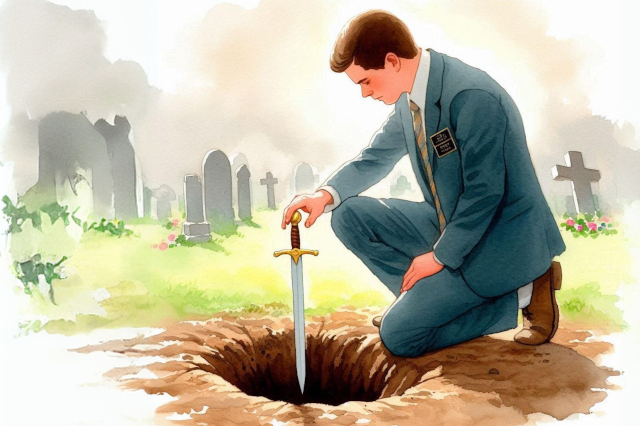
Fleeing Babylon (without going anywhere)
Right now in Come, Follow Me, we are studying the journeys of Abraham and his family. His people, including his father, had turned from the Lord to serve other gods, even going so far as to sacrifice innocent children to their false gods. Soon, the sacrificial knife turned on Abraham himself. When God intervened, what was Abraham told to do? Get out of Dodge, of course!
Fleeing ancient Babylon
This pattern of fleeing wickedness didn’t stop with Abraham— it’s a common thread throughout scripture. A few examples:
- Abraham, then Lot fled Sodom and Gomorrah to escape the wickedness and destruction.
- The Israelites fled out of wicked Pharaoh’s Egypt to worship God and re-establish a covenant with Him.
- Nehemiah fled from the Persians to return to Jerusalem and re-establish covenantal worship at the first available opportunity.
- Lehi fled from the wickedness of Jerusalem to travel to a promised land of freedom and covenant
- After Lehi died in the promised land, the Lord warned Nephi to flee and put distance between himself and his wicked brothers.
- The Lord warned King Mosiah and his righteous people to flee from the wicked Nephites into the wilderness, eventually discovering the land of Zarahemla and establishing the new Nephite capital.
- The people of Alma fled from the rule of king Noah so they could worship the Lord in peace.
- The humbled people of Limhi fled from the indolent Lamanites the moment someone could point them the way out.
- The people of Ammon fled the persecutions of their wicked countrymen and took on a new identity in their former enemies’ land.
- The original Jaredite family fled their wicked homeland when God confounded the languages.
- The righteous king Omer and his family were warned to flee from the rest of the wicked Jaredites.
- In our dispensation, the Lord warned Joseph Smith and Brigham Young to flee the intolerance of the United States proper and establish themselves in the west where they could worship God as they saw fit.

You get the picture. Over and over again, the Lord has commanded His saints to follow the pattern:
- “Go ye out from Babylon. Be ye clean.”
- “Go ye out of Babylon; gather ye out.”
- “Go ye out from among the nations, even from Babylon, from the midst of wickedness, which is spiritual Babylon.”
- “Flee out of the midst of Babylon, and deliver every man his soul.”
- “Babylon the great is fallen… Come out of her, my people, that ye be not partakers of her sins”.”
Modern Babylon: less isolating and physically dangerous than ancient Babylon
I’m not a fan of exaggerating our trials. Compared to earlier dispensations, and even compared to the pioneers of our own, we in the last days have it really good right now.
We are blessed by a weakening but still robust system of Constitutional protections that allow us more free exercise than has ever been seen in earth’s history before the American Revolution. So while we occasionally face ridicule and vitriol for our beliefs, we are far from the struggles of previous generations where believers were driven from town at gunpoint. Compared to most of human history, we are still living in the safest, most religiously tolerant nation and time in the history of the world.
As the ironically intolerant philosophy of moral relativism takes greater hold on society, we are starting to see that “the truths and values we embrace are mocked on every hand” again. But we are not mocked alone— many religions and faith traditions stand next to us in solidarity and defense of moral truth. It is a blessing to be part of the larger community of believers this time.
So, things are still pretty great and whoever says it’s a dumpster fire needs to read their religious history and get some perspective.
Modern Babylon: just as spiritually deadly as ancient Babylon
But while are aware that while we are currently legally protected and “[our] friends do stand by [us],” we should also recognize the “exceedingly precarious and dangerous” circumstances we are in spiritually: Babylon is obviously the dominant voice in the world right now, and it grows only stronger. Perhaps we don’t fully give it credit for how far it has grown.
A member of my stake presidency recently tried this experiment at the pulpit; I invite you to try it at home: Have your kid verbally ask Siri/Alexa/Google about a moral topic from For the Strength of Youth and see how much alignment there is. For example, I just asked my Google device the following questions:
- “Is pornography okay?”
- “Is it okay to have sex before marriage?”
- “Is it okay to swear?”
- “Is it okay to get a tattoo?”
- “Is it okay to lie?”
I tried this just now as I was writing this. According to Google Assistant:
- Pornography is a great stress outlet and completely harmless.
- Sex is fine before marriage because it’s so very healthy.
- Swearing is encouraged because it strengthens emotional resilience.
- Tattoos don’t carry health risks and people who get them love them.
- Lying is okay as long as you’re not trying to hurt someone.

When it comes to morals, especially sexual morals, most in today’s society truly “call evil good, and good evil; … put darkness for light, and light for darkness; … put bitter for sweet, and sweet for bitter.” As Elder Wirthlin and others taught, the world is at or approaching levels of personal sin and wickedness comparable to the people at the time of Noah.
In some ways, we are even worse than any dispensation past. We don’t know exactly how many kids were killed for the pleasure of false gods in the days of Abraham and Israel. But we suppose that no nation on earth in times past, no matter how depraved, could have dreamed of the satanic efficiency we have achieved in sacrificing our own innocent children. In this country, one out of every five children that God entrusts to mothers gets sacrificed on the altars of convenience in the satanic temples of Planned Parenthood and other abortion providers. In some communities, a baby is more likely to be killed than to be born.
After these modern-day priests of Elkenah dismember their victims and complete their ritual, they rummage through the dismembered limbs and organs like vultures, looking for intact pieces they can sell, then discard the mangled but still precious bodies into a plastic bin to be cremated en masse without a second thought. The ancient fires of Molech, and even the hellish ovens of the Nazis, are statistically no match against the millions of childrens’ lives we have barbarically snuffed out through abortion.
No more fleeing Babylon
When we ponder on the immensity of abortion and other evils facing us and “awake to a sense of [our] awful situation,” our first instinct may be to do as Saints of dispensations past: to flee! Gather the believers, circle the wagons, and let the rest of the world destroy itself while we sit protected, gathered in the haven of our community.
Some day, some of us may do just that. We do believe in the literal gathering of Israel and the literal building of the city of Zion here in the Americas. But if I read the scriptures correctly, not all of us will be gathered to Missouri— there will still be stakes of Zion throughout the world. Furthermore, while our predecessors could flee the influence of ancient Babylon by moving a few hundred miles away, the influence of modern-day Babylon extends wirelessly at the speed of light through space and air; do you really think the whole city of Zion will have no internet access? In an interconnected world such as ours, there is just nowhere left to flee.
No, as much as we may want to hole up in a cabin somewhere, physically fleeing Babylon is not the answer. Not this time. We are not commanded to flee away like Lehi and the Jaredites. This time, we are commanded to stay. We are commanded, like Mormon and Moroni and Ether, to work and to serve and to bear record until the very end.

As usual when I write in this blog, I find a talk that almost makes my whole post redundant. In this case, it’s Elder Holland, making this point far more eloquently than I ever could:
This has been Israel’s history down through the ages. When things got too sinful, or there was too much secularization in society, or life with the Gentiles was destroying the moral code and commandments God had given, the children of the covenant would be sent fleeing into the wilderness to reestablish Zion and start all over again… For more than 4,000 years of covenantal history, this has been the pattern: Flee and seek. Run and settle. Escape Babylon. Build Zion’s protective walls.
Until now. Until tonight. Until this our day… The Church of God will never again flee. It will never again leave Ur in order to leave Haran, in order to leave Canaan, in order to leave Jerusalem, in order to leave England, in order to leave Kirtland, in order to leave Nauvoo, in order to go who knows where…
In the 21st century we cannot flee any longer. We are going to have to fight for laws and circumstances and environments that allow the free exercise of religion and our franchise in it… in a world from which we cannot flee…
The children of Israel are… not to flee Babylon this time but to attack it.
Freeing ourselves from Babylon
So if we aren’t supposed to hole up in a remote cabin somewhere, how are we to escape the damning influence of Babylon’s evils? While we are not to physically escape, we are to escape spiritually. We don’t flee Babylon, but we keep free of its stains. God has given us two sacred sanctuaries of refuge that let us escape the influence of Babylon, even when we are right in the midst of it.
First, the Holy Temple. Those of us blessed to live within close proximity to a temple experienced these past two years a reality faced daily by many Saints across the world in diverse areas: limited or no access to the physically gather in the protective House of the Lord. I hope these two years have given us deeper gratitude for Temple blessings.
But even while access to the House of the Lord has been restricted, we never lost access to the second sanctuary of refuge God has given us: our own houses— the only other structures on earth that “can compare with the temple in sacredness.”
I have been in homes that compare with the temple in sacredness. These “finest homes” are not white inside and out. They are not immaculate and sparse. Their occupants do not always speak in reverent whispers. Many of these homes are humble, maybe a little messy, and often echo with the chattering voices of children. Yet the Spirit is palpably present there, and everyone— member and non-member alike— can feel the difference when they step through the front door. A drug dealer might live next door and sirens might be heard every night, but these homes— these personal temples— have fled Babylon even while Babylon surrounds them on every side.
Developing homes comparable to the Temple

What do you need to do to make your home better “compare with the temple in sacredness?” I can’t answer that question for you. But I can answer that question “for me and my house.”
A few nights ago, I was prompted to imagine how different my family might be if we had been one generation older. How would our family’s everyday life be different if we were a young couple raising three young children at the same time our parents were raising us, for example? The internet, cell phones, DVD players— these had yet to make their way to the masses. What would our evenings with the kids look like? What would our evenings after the kids go to bed look like? And most importantly, would that lifestyle have nudged our home more towards the Temple end of the spectrum? Or the Babylon end? For my home, the answer is clear.
Don’t get me wrong, I love technology. I love being able to create and share things that matter to me. I enjoy interacting with like-minded people and getting a closer view into the lives of people whose experiences and thoughts I never would have known otherwise. I love streaming the wealth of amazing, mind-expanding content out there into my home. We get to experience the best science, history, and seminary classes in our living room whenever we want!
And then there’s the entertainment. I’ll be clear that we work hard to keep pernicious influences off our screens. And not just for the kids. My wife and I decided at the beginning of our marriage that the standards we were taught in For the Strength of Youth are just as applicable to us as adults. Even when our kids are asleep, evil has no place on our TV.
And yet, “a distraction doesn’t have to be evil to be effective.” Even though what we watch, read, play, and do online is often good, it is usually not the best use of our time. Too many evenings each week are spent watching entertaining or even educational videos that ultimately do nothing to bring us together as a couple or prepare us emotionally and spiritually for the day ahead. Like Pres. Packer’s analogy of the snow-trapped deer, our nutrient-less diet of spiritual hay may leave our minds feeling content even while we are spiritually starving. Even as I consider all the amazing blessings the past 30-40 years of technology have afforded me and my family, I must admit that when it comes to our “downtime,” its net impact is not a positive one.
Elder David R. Stone wrote an article a few years back about creating “Zion in the midst of Babylon.” He told of sitting in the Manhattan Temple’s celestial room:
in perfect silence, without a single sound to be heard coming from the busy New York streets outside. How was it possible that the temple could be so reverently silent when the hustle and bustle of the metropolis was just a few yards away?
The answer was in the construction of the temple. The temple was built within the walls of an existing building, and the inner walls of the temple were connected to the outer walls at only a very few junction points. That is how the temple (Zion) limited the effects of Babylon, or the world outside.
In contrast to the Manhattan Temple, when we count up all internet-connected and entertainment devices we have, we realized that our home — our temple— has many junction points to the hectic world outside.
So what are we going to do? Turn off the electric lights and pull out the oil lamps? Not quite. But we are making some changes to how we interact with technology to bring our family and couple time a little closer to how it would have been one generation past. For example, my wife and I are powering off our tablets/phones/computers/TVs a few evenings each week after the kids go to bed so we spend more time talking or reading books together.
And when we do sit down to watch something, we’re trying to be more intentional about it. Remember one generation past when there was a Blockbuster on every corner? Family movie nights involved thought, effort, planning, and investment. We want to get away from mindless scrolling through what Netflix wants to show us and instead curate a list of entertainment we want to watch. Acting and not acted upon.
As with many things in life, a little bit goes a long way. We’ve only been trying these small, incremental changes for a few weeks, but already I’m seeing a difference in our homes and our relationships. We speak a little more kindly. The time my wife and I spend together is more memorable. Home is a little more… Temple-like. I love it.


